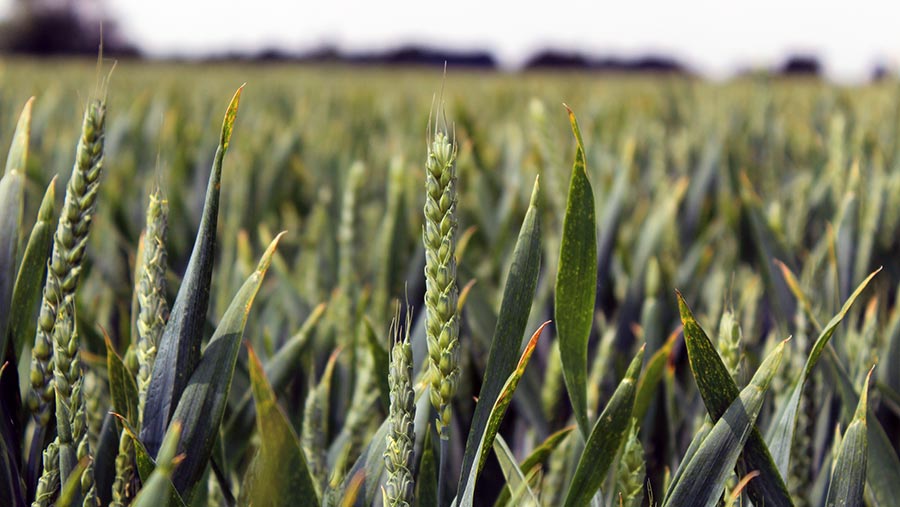Organic trial reveals top three highest-yielding wheat varieties

Evolution, Costello and Revelation were the three highest-yielding wheat varieties in the second year of variety comparison trials being carried out to help organic farmers find the best options to grow without chemical inputs.
Picking which varieties to grow is a challenge for organic farmers, as using the untreated figures on the AHDB Recommended List does not give a full picture. That’s because untreated plots still receive fertiliser and growth regulators.
See also: Why one grower went organic to tackle blackgrass problem
Dominic Amos, crop researcher at the Organic Research Centre, explained:
“It’s difficult for organic farmers to have confidence in wheat varieties as most current testing doesn’t give enough weight to the nutrient scavenging and weed suppression traits that organic farmers rely on much more in the absence of fertiliser and herbicide regimes.”
To identify the most suitable varieties, the ongoing farmer-led research tested 22 different wheat varieties in plot trials on organic land, to discover which types have traits most suitable for farming without chemical inputs.
Assessments included disease susceptibility, protein levels, yield and growth characteristics, all providing valuable insight to farmers on variety choice.
For the second year, popular conventional varieties such as Zyatt and Skyfall did not perform as well as other varieties when grown under organic conditions. Zyatt yielded 1.49t/ha less than the top yielder, putting it in 17th place.
In the first year of the project, European variety Mortimer was the top performer and it also performed well in the second season, yielding 4.02t/ha.
However, for harvest 2019 Evolution took the top spot with a yield of 4.47t/ha, followed by Costello and Revelation with yields of 4.42 and 4.35t/ha, respectively.
But Mr Amos highlighted that the top yielders also tended to have the lowest harvested protein yields.
Other findings from the project include:
- Heritage wheat variety Maris Widgeon performed as well as commonly grown varieties such as Skyfall, both in terms of yield and protein levels.
- Ehogold, Edelmann, Mv Fredericia (AWC1) and Skyfall showed the most susceptibility to yellow rust, which remains the most damaging foliar disease for organic farmers. However, the 2019 season was particularly bad for this disease and most varieties in the trial had resistance scores reduced compared with the previous year.
- Some varieties are suited to particular systems. For example, growers using an inter-row hoeing weeding system preferred the Mv Fredericia variety because it was tall and erect at early stem extension. However, those who use other weed management systems preferred the variety Montana for its even canopy, high ground cover and a slightly more prostrate growth habit.
The field lab, run through Innovative Farmers, is mainly taking place on the Bradwell Grove Estate in Oxfordshire.
The trial is now in its third year and will continue to test wheat varieties in organic conditions to provide insights for any farmer looking to avoid or reduce inputs. Innovative Farmers is part of the Duchy Future Farming Programme.

